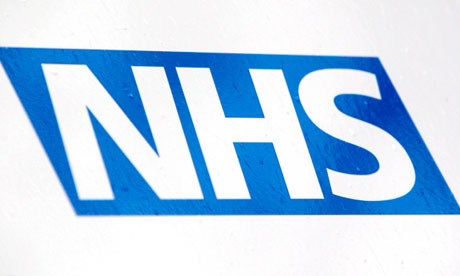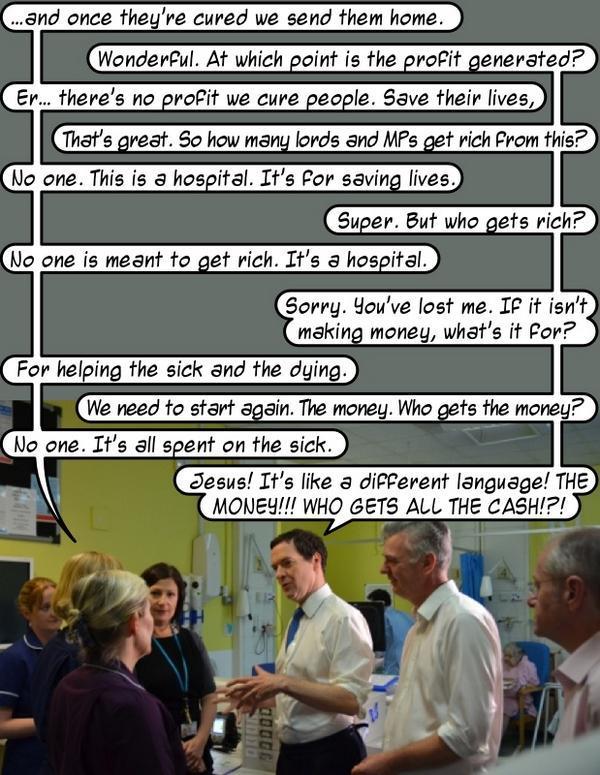Even middle England can see that privatisation costs, rather than saves, billions. Will MPs take a historic chance to undo this market mess that’s crippling our NHS, this Friday?

Privatisation is bad for our pockets as well as bad for our health. We can’t afford it. MPs must back the NHS Bill (which should be heard in Parliament this Friday). That’s the message from an illustrious group of academics, experts and celebrities, in a letter to the Guardian last Saturday.
The experts turn the nostrums of market efficiency which the free-marketeers have inculcated us with over the last 30+ years, on their head, writing:
“Privatised services cost the NHS and taxpayer far more than when provided by our publicly owned and publicly run NHS. That is because public health systems don’t seek profits. They don’t need to pay dividends to shareholders. They don’t have the added costs of private sector loans. And they don’t have privatisation’s heavy and unnecessary marketising costs of contracts, billings and all the extra administration involved.
The huge commercial costs and chaos caused by the ongoing NHS fragmentation are the direct result of privatisation. This is endangering the quality and safety of our public healthcare. That is why we need the National Health Service bill.”
And – noting how so much is being sneakily privatised under the NHS logo, they add:
“NHS services and assets, including blood supplies, nurses, scanning and diagnostic services, ambulances, care homes, hospital beds and buildings – which the British public own – are being handed over to UK and foreign private companies. This is being done without a public mandate.”
I only really got hold of this when I had an MRI scan last September. From quizzing the radiographer, my GP and scanner suppliers and researching the purchase, manning and maintenance costs it seemed clear that my scan – provided by a private company – cost the NHS at least 25% more than if it had been provided by a nationalised NHS.
The inflated costs are everywhere – from PFI (£1bn a year) to profits made by private providers, to the vast costs of running the NHS as a ‘market’ (in fact, as a privatisers’ bureaucracy) – costs that are fiercely denied by pro-market advocates and carefully obscured by government – and independently estimated to waste anywhere between £4.5bn and £10bn a year – or more.
The economic case for renationalising the NHS and restoring it as a publicly owned and run entity seems unarguable. It should be the Labour Party’s trump card.
So why is the Corbyn leadership being so slow to grasp this gift horse? Why hasn’t it yet publicly embraced the NHS Bill which clearly sets out its intent to strip away the expensive market bureaucracy the NHS can ill afford?
Is Corbyn being “got at” as a well-placed observer suggested at the NHS Bill group meeting I attended a few days ago? Is his party running scared of fuelling the Greens, whose solo MP Caroline Lucas has been the tabler of the NHS Bill in Parliament and of whose renationalisation-studded Election manifesto the President of the RMT Peter Pinkney barked last March “If that isn’t bloody Socialism I don’t know what is!”
Or is the mantra of electability and the City-honed Damocles sword of Labour’s economic ‘incompetence’, which the Mandelson camp followers have held to the party’s throat for so long, still keeping even its newbie lefty(ish) leadership kneeling in an NHS policy desert?
A member of my West London 38 Degrees group, a lifelong Tory now lapsed, has no such hesitation. She supports the Bill and doesn’t mince her words in her letter to our local Tory MP; “We are not idiots; this government is pushing the country into private hands in every direction – and you only got 24% of the vote. I doubt any of you will get another term in office and the opposition parties are not any better.”
Signing herself “a sad, disillusioned resident of Fulham and ex-believer in the Conservative Party” she’s a powerful example of the simmering rage at the privateers’ long unfettering. “All they think of is money. What’s more important? Being aware of other people or just making money?” she asked me rhetorically.
This quiet rage at the corrupting monetisation of our political and civil institutions runs deep and wide and courses across party lines. And it’s up for grabs by a Labour Party prepared to stick its neck over the parapet and see a landscape budding with potential and surprising allies.
Suddenly this weekend there are straws of hope in the wind for NHS campaigners. The Socialist Health Association (SHA), like ex-Shadow Health Minister Andy Burnham, have been purveyors of the Blair/Mandelson City-sugared line on the NHS, which would leave it vulnerable to continuing privatisation under international trade and competition agreements. Accordingly they (the SHA) have been long-time opponents of the Bill.
But on Saturday their AGM voted by 30-1 to strongly back the Bill and do everything they could to encourage Labour MPs to back it. Does this signify a ‘left turn’ within the SHA? And – given some of its senior figures are rumoured to be amongst Heidi Alexander’s close advisors – what might all this portend for her future positioning on the NHS?
More importantly Shadow Chancellor John McDonnell has publicly re-confirmed his support for the Bill. The Shadow Health team have agreed to attend its Second Reading and debate next Friday 11th. Campaigners understand that there have now been discussions between Jeremy Corbyn, Heidi Alexander and Caroline Lucas.
Filming Joanna Adams in Darlington two days ago for the continuing saga of my documentary series Groundswell about her and the 999 Call For The NHS campaigners, I asked this organisation’s founder what she made of the Labour Party’s post-Corbyn shapeshifting. An acute campaigner, Joanna senses a sliding of the sands from under the Blairite sword-wielders of old and their followers.
But for now she’s staying with the Greens. If Labour can’t win back grassroots supporters like her from Labour’s old heartlands then its future as a party with a working majority seems bleak. It is in danger of being outgrown by the ‘new’ politics of internet-savvy, issue-driven grassroots. For them the 2008 crash and bank bailouts were a game changer – exposing not only the dirty secrets of the privateers and bankers, but the how whole the Blair project depended on the rigged, debt-inflated airbagging of Western economies which has been the developed world’s economic cornerstone since the late 1960’s and has now been punctured.
The NHS Bill is a game-changer, too, for the Labour Party. As its co-author Peter Roderick has said, it’s a gauntlet thrown down to the party and its moribund inheritance. Friday’s Day Of Action is an early staging post in the long struggle ahead to save the NHS from the bankers and privateers.
It’s a significant moment for the party that brought the NHS into being and an opportunity for it to further the necessary reconnection with its origins that the Corbyn ‘phenomenon’ has signalled.
How you can help: We’re asking everyone to ask their MP to attend the debate on Friday (details on the NHS Bill website) and, if you can, to come to the rally outside parliament from 11am on Friday, details here, and/or earlier outside the Department of Health at 9.45am, details here.
A fuller Q&A can be downloaded here, and leaflets to distribute in advance or on the day, clearly spelling out what’s at stake, can be downloaded here.
This article is published under a Creative Commons Attribution-NonCommercial 4.0 International licence. source
Related Articles
To save our health service MPs must stand together and back the NHS Reinstatement Bill
Caroline Lucas
New law proposed to “stop the NHS becoming simply a memory”
Caroline Molloy

